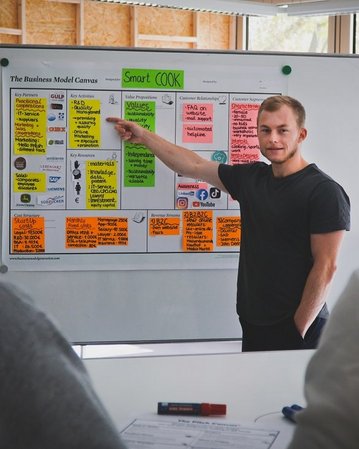
What exactly makes a good business idea? And how can I acquire the necessary expertise? Business Administration student Max Rudolf offers an insight into his Entrepreneur course.
What exactly makes a good business idea? And how can I acquire the necessary expertise? Business Administration student Max Rudolf offers an insight into his Entrepreneur course.
The start-up phase is arguably one of the most difficult and error-prone aspects of business. This problem is addressed by the Founder Institute, which offers bespoke solutions for all start-ups.
The Founder Institute focuses on answering the two above questions, and offers pragmatic solutions aimed at encouraging both students and budding entrepreneurs to think outside the box.
Honing in on everyday life
Developing a business idea is all about honing in on your own everyday life and identifying problems that have yet to be solved adequately. However, there’s no catch-all solution for brainstorming. The Founder Institute provides assistance based on many years of experience, enabling you to develop a marketable idea.
But the process does not begin with brainstorming. You first need to understand, observe and define your perspective. The ideal way to do this is to ask yourself the following questions: In which market do we operate? How do we go about finding information about it? How can I generate an idea?
The team is key to success
“The Founder Institute cannot make the idea a success,” remarked Professor Bernhard Küppers, Head of the Founder Institute. “The team is key to success: a first-class team can even make a second-rate idea work, but a second-rate team will be unable to make a success out of a first-class idea. The complementarity of a team’s members is crucial to team success. For example, one of the team members must be an expert in financial matters, with all other areas being addressed by the remaining members accordingly,” explained the institute leader.
“I find it hard to work out alone.”
In our case, the problem was about fighting the inner couch potato: “Every year, I resolve to work on my bikini figure, but I find it hard to work out alone,” explained Lina, a student of Business Administration at SRH University Heidelberg. To solve the problem, it’s important to find a way to bring people together who are keen to work out, but are unable to fight their inner couch alone.
Address the target group
It’s “better to fail fast than to fail slow,” reasoned Alexander Roth, lecturer at the Founder Institute. Entrepreneurs often have too much faith in their own ideas, and fail to solve any real-life problems. It’s important to be mindful of what users feel, see, say and hear. A one-sided view of the problem will inevitably lead to failure. This is why it’s important to contact as many potential customers as possible during the start-up process, and to present the problem – and your solution – to them so as to get feedback.
Bernhard Küppers offers the following advice to anyone thinking of setting up their own business: “Come and see us. We at the Founder Institute are there to help and advise you at any time.”
Our brief series for first-year students comes to a close tomorrow with an overview of how committees are structured at our university, and why it’s well worth getting involved!


Discover your degree programme up close! Book your taster session now!